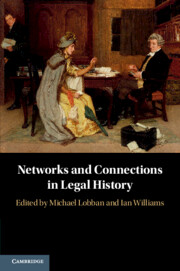Book contents
- Networks and Connections in Legal History
- Networks and Connections in Legal History
- Copyright page
- Contents
- Contributors
- 1 Introduction
- 2 Networks and Influences
- 3 Men of Law and Legal Networks in Aberdeen, Principally in 1600–1650
- 4 Calling Time at the Bar
- 5 The Thistle, the Rose, and the Palm
- 6 ‘The Bengal Boiler’
- 7 The White Ensign on Land
- 8 A Broker’s Advice
- 9 Trans-Atlantic Connections
- 10 Interpretatio ex aequo et bono
- 11 Shakespeare and the European ius commune
- 12 Law Reporting and Law-Making
- 13 John Taylor Coleridge and English Criminal Law
- Index
11 - Shakespeare and the European ius commune
Published online by Cambridge University Press: 10 August 2020
- Networks and Connections in Legal History
- Networks and Connections in Legal History
- Copyright page
- Contents
- Contributors
- 1 Introduction
- 2 Networks and Influences
- 3 Men of Law and Legal Networks in Aberdeen, Principally in 1600–1650
- 4 Calling Time at the Bar
- 5 The Thistle, the Rose, and the Palm
- 6 ‘The Bengal Boiler’
- 7 The White Ensign on Land
- 8 A Broker’s Advice
- 9 Trans-Atlantic Connections
- 10 Interpretatio ex aequo et bono
- 11 Shakespeare and the European ius commune
- 12 Law Reporting and Law-Making
- 13 John Taylor Coleridge and English Criminal Law
- Index
Summary
This chapter explores Shakespeare’s knowledge and use of the European ius commune. The ius commune was the amalgam of Roman and canon law taught in Europe’s universities, including England’s, and employed as the basic source of law in European legal tribunals to the eighteenth century. It was applied in the courts of the English church, the Admiralty, the universities, and some of the courts of equity that had come to life in the sixteenth century. These courts were served by a separate legal profession, the English civilians. Recent interest in Shakespeare’s knowledge and use of law takes virtually no notice of this aspect of English law. This chapter demonstrates a number of points. The first is that Shakespeare was familiar with the ius commune. He used its terminology and then made something of it in the dialogue of his plays. The second is that this knowledge had results in their thematic coverage. He employed his knowledge of the ius commune to shape and enrich the substance of the plays. The third is that his use of the civil and canon laws was connected with areas of contemporary controversy in England.
- Type
- Chapter
- Information
- Networks and Connections in Legal History , pp. 262 - 284Publisher: Cambridge University PressPrint publication year: 2020

